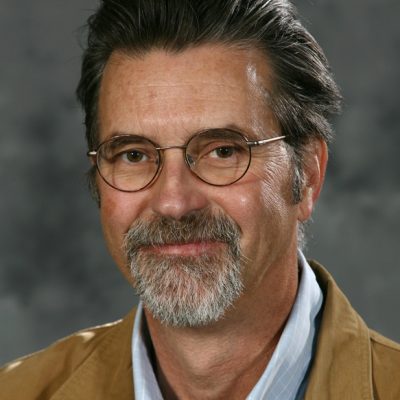Writing as a Practical Skill and Philosophy of Life
 According to Dr. Reuben Ellis, chair of Woodbury’s Writing Department, the process of writing and the events of an exciting and fulfilling life are intertwined in meaningful and surprising ways. “Sometimes I don’t know which is the hand,” he says, “and which is the glove.”
According to Dr. Reuben Ellis, chair of Woodbury’s Writing Department, the process of writing and the events of an exciting and fulfilling life are intertwined in meaningful and surprising ways. “Sometimes I don’t know which is the hand,” he says, “and which is the glove.”
Dr. Ellis’ career has had many facets — his time as an organic farmer near the Canadian border, his experience as a mountaineer, his early work as a freelance journalist, his leadership of field courses in the backcountry of the southwest, and perhaps most significantly, his years teaching writing at Woodbury. “If you want to write,” he says, “get out and live—the words won’t take care of themselves, but you will know how to take care of them.”
Dr. Ellis loves serving as chair of the Writing Department. “A marvelous group of students and faculty make up the writing program here at Woodbury,” he says.“I am fortunate enough to share in their outstanding and passionate work every day.” “Someone once told me that being a department chair is like being a shock absorber on a car,” he added. “Your job is to smooth out the bumps for both students and faculty colleagues. It is very satisfying work.” The Writing Department contributes to the university community in three ways — it offers a major and minor in Professional Writing for students exploring their interest in writing; it provides first-year composition courses that help all students practice and develop their writing skills as part of the university’s general education program; and it operates the Writing Center, which provides writing support services to the entire Woodbury community.
Both a creative writer and a scholar of American literature, Dr. Ellis is author of four books and several dozen shorter works. His book of poems, “Formula,” asks readers to understand language as powerful, capable of making things happen. His three books of scholarship, “Vertical Margins: Mountaineering and the Landscapes of Neo-Imperialism,” “Stories and Stone: Writing the Ancestral Pueblo Homeland,” and “Beyond Borders: The Selected Essays of Mary Austin,” deal in different ways with how we interact with natural and cultural boundaries. Dr. Ellis has also published “Networked Compositional Ecologies,” an article about multimodal composition, and presented “Non-Necessary Connections,” a paper co-authored with Writing Center Director Laurel DiGangi, at an international conference on writing center studies in Santiago, Chile. While serving on the Sustainability Committee at Woodbury, Dr. Ellis, along with student and faculty co-authors, presented a paper at the American Association for Sustainability in Higher Education (AASHE). Dr. Ellis is particularly interested in how we can read literature to understand the ruins and rock art of the American southwest. This is the topic of his current book project.
Writing, for Dr. Ellis, is both a practical skill and a kind of philosophy of life. “A major or minor in professional writing,” he says, “gives interested students the language toolkit to make a living as a writer, while at the same time nurturing their talents for creative expression.”
According to Dr. Ellis, this tough and joyful process lies close to the core of who we are. “Some people imagine that our best ideas spring fully-formed from our minds ready to go,” he notes. “I think that rarely happens. Only when we express our ideas–haltingly perhaps, tentatively sometimes–through the creative lens of language do our ideas really attain their potential.” Like legendary journalist and writer, Joan Didion, “I write entirely to find out what I’m thinking,” he says.